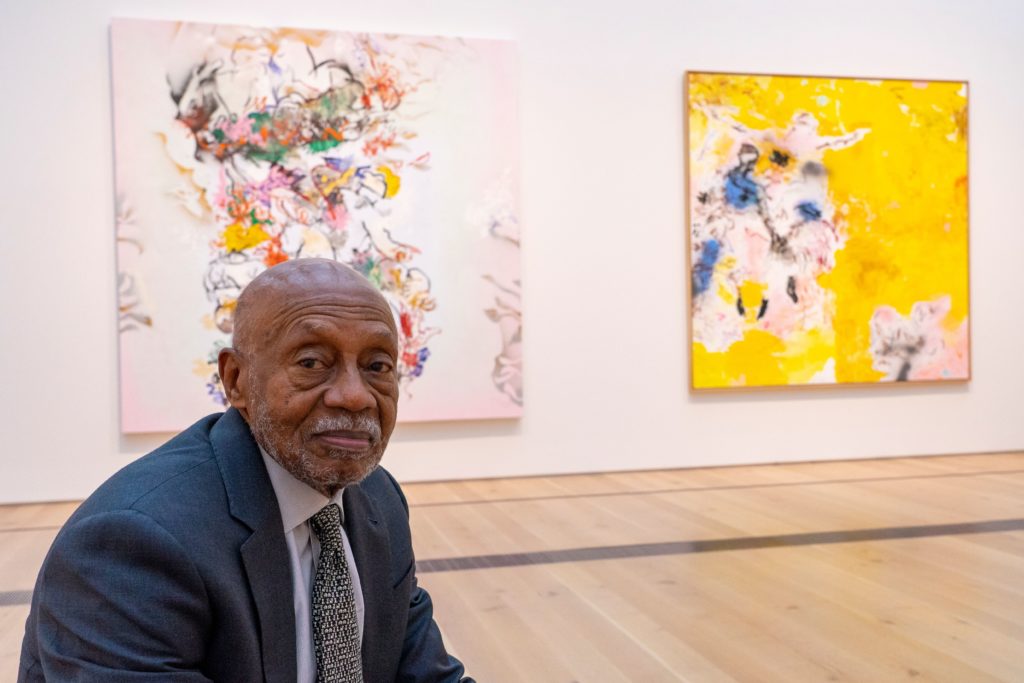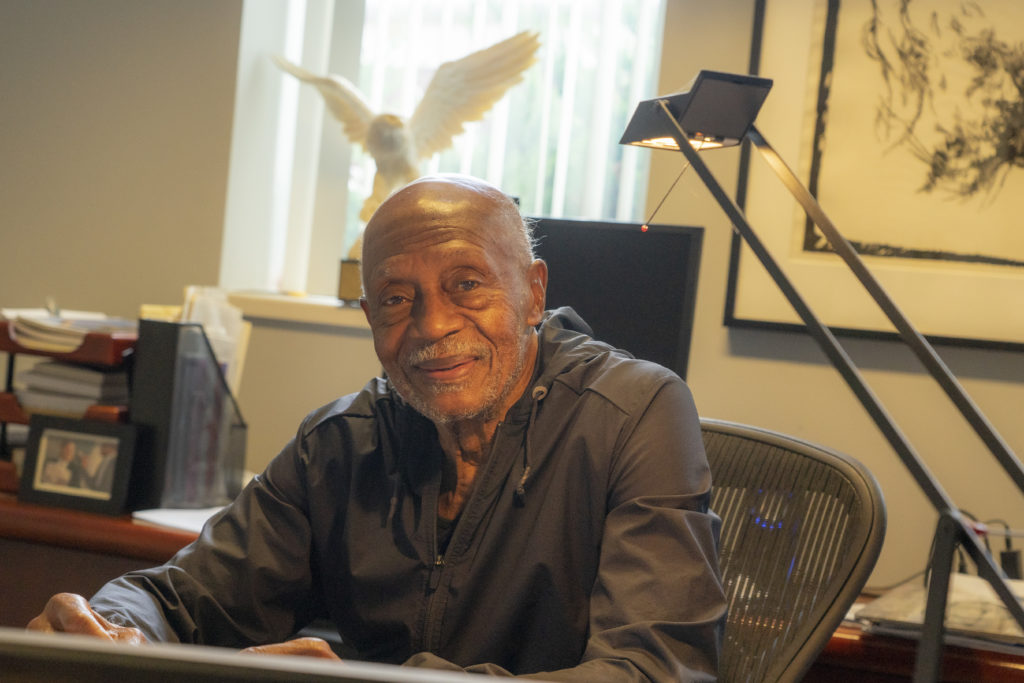GJR honors publisher, editor of The St. Louis American with lifetime award
Dr. Donald M. Suggs has spent his lifetime accomplishing one achievement after another. He was the first in his family to complete high school. He is an oral surgeon-cum-civil rights advocate, art collector, and newspaper editor and publisher.
As executive editor and publisher of The St. Louis American Suggs is chief producer and promoter of the 93-year-old weekly newspaper — not just keeping the American alive but also striving to adapt and change as it provides vital information for people throughout the St. Louis metropolitan area. All people. Blacks, whites and people of other ethnicities have come to trust the American to tell news and feature stories as seen through an African American lens.

Suggs is this year’s recipient of the Gateway Journalism Review’s Lifetime Achievement Award. He will be honored Oct. 27 at the magazine’s annual First Amendment Celebration.
An influencer of public thought, Suggs sits on more than two dozen boards of directors or trustees, ranging from the Barnes-Jewish Goldfarb School of Nursing (emeritus member) to the Urban League of Metropolitan St. Louis.
When he’s not shifting from Zoom meetings with his newspaper staff to those of the myriad of other organizations he supports, he’s writing pointed editorials and overseeing page production for Wednesday afternoon deadlines.
The Suggs of today has come a long way from where he started.
Donald Marthal Suggs was born Aug. 7,1932, to Morris and Elnora Suggs. His father was born in Terre Haute, Indiana, and grew up in Kentucky. His mother was born in Montpelier, Mississippi.
The couple met and settled in East Chicago, Indiana, where Morris Suggs worked in a steel mill, their families having joined others who were part of the Great Migration from the South to the industrial centers in the North.
The couple had three children: Donald, Loretta and Walter.
Though he grew up in the age of segregation, the young Suggs was raised in an integrated environment of the small, factory town. He attended public schools with the children of Eastern European and Hispanic immigrants.
“I had a ‘mixed’ kind of upbringing,” he told GJR, adding that he learned to “code switch” at an early age.
His father, he said, was a voracious reader.
“He was intellectually curious.”
Early influences
Growing up with Black newspapers such as The Chicago Defender and the Pittsburgh Courier in his home, the young Suggs followed his father’s lead and also developed an intellectual curiosity.
In high school, with his then-best friend, Donald Peters, Suggs started a newspaper — The Galloping Gossip.
But it wasn’t until much later that he would return to that first passion for sharing news.
After high school he spent a year working while taking classes at an extension program of Indiana University. He went on to enroll full time at the university, earning his bachelor’s degree in dentistry and his doctorate of dental surgery — D.D.S. He was one of two Black students in his graduating class when he completed graduate school.

It was while he was a student that he began learning about, and developing an appreciation for, fine art. During his high school years, he spent summers with his paternal grandparents in Chicago and visited places like the Art Institute.
On visits to New York, he began exploring art even more.
“New York was my North Star,” he said.
He came to St. Louis for an internship in 1957 and medical residency a year later at the historic Homer G. Phillips Hospital.
Suggs chose Phillips — known as a training ground for a generation of Black physicians — over an internship in New York “because I thought Blacks were in charge.”
It was also in St. Louis that he turned his focus on the burgeoning civil rights movement.
As he started on the activism trail, however, Suggs said initially he was viewed with suspicion.
“I had two fights: one with our political opponents and also with those on the inside, who were suspicious that I was a plant,” because of his speech, mannerism and advanced education.
During this time, he met two men who would become his closest friends for the coming decades.
The Joneses
Mike Jones was a sophomore at the University of Missouri, St. Louis, in 1968, when he met Suggs.
“Donald was a revolutionary oral surgeon,” Jones said.
“He drove a Volkswagen and collected African art. He was leading the Poor People’s March.”
In fact, Suggs served as the St. Louis chairman of the Poor People’s March on Washington for Jobs and Freedom. The historic 1968 event was organized to call for economic justice in the United States.
Under Suggs’ leadership, St. Louis sent busloads of people to Washington, D.C., joining more than 200,000 others from around the country who had come to hear from civil rights, labor and religious leaders. The march had been planned by the Rev. Martin Luther King Jr. for the summer five years after he delivered his “I have a dream” speech. But King was assassinated that April and the Rev. Ralph Abernathy carried on with the march.
Jones said he was introduced to Suggs by a college friend during Jones’ days as a student-activist.
“Take away the movement, Donald and I would have never met,” Jones said.
“He had a profound effect on me. He nurtured my intellectual development.”
Jones has served on the Missouri Board of Education, and was deputy mayor for development of the City of St. Louis and a senior policy advisor for the St. Louis County executive. Today he is a regular opinion writer for the American.
“Without the American,” Jones said, “the Black community [in St. Louis] would be totally ignored.” In the American “there is a forum for Black perspective and Black voice.”
Virvus Jones, who is not related to Mike, met Suggs when the young surgeon was balancing his dental practice, cultural pursuits and activism.
“Doc always had an interest in history and politics,” Virvus Jones said. At Suggs’ home at the time in University City, “there were these African sculptures … He showed me how Picasso copied a lot of African art.”
A Vietnam war veteran and former St. Louis comptroller, Virus Jones is the father of St. Louis Mayor Tishaura Jones. Though Virvus Jones for years contributed to the American’s “Political Eye” opinion column, he stopped as his daughter, a former St. Louis treasurer and Missouri state representative, rose in politics.
Suggs’ passion for art and politics grew along with his family.
He is the father of Dawn Suggs who is the American’s digital and special projects director, Dina Suggs, who lives in New York and Donald Suggs Jr., who died in 2012, and grandfather of Delali Suggs-Akaffu.
“I was attracted to the artistic community, [but] I didn’t have talent,” Suggs said.
What he did have was connections, which led him to establish the African Continuum, an organization that brought to St. Louis what he called “serious, non-commercial artistic endeavors:” musicians, theater performances and fine artists.
He also helped establish the Alexander, Roth, Suggs Gallery of African Art, with locations in St. Louis and New York City.
Running a newspaper
The St. Louis American was established by Nathan B. Young in 1928. N.A. Sweets sold advertising in the early days before taking over in the mid-1930s. Sweets went on to run the paper with his wife, Melba Sweets, until 1981.
When the Sweets family stepped down, the paper was purchased by business partners Dr. Benjamin Davis, Clifton Gates and Gene Liss.
After Davis died a few years later, Suggs joined the other partners. He eventually bought them out and assumed control of the paper in the mid-1980s.
“He always loved the American because it was well written,” said Fred Sweets, son of N.A. and Melba, and a former photographer at the St. Louis Post-Dispatch.
“He is committed to quality journalism.”
The American today
Yet another Jones — Kevin Jones — started out selling advertising for the American almost 30 years ago. Today he is the paper’s chief operating officer, in charge of advertising, circulation and supervision of the business staff. The American currently distributes about 50,000 papers each week through about 700 locations in Missouri and Illinois.
Kevin Jones described Suggs as a visionary and extremely energetic.

“He’s up at the gym when I’m still asleep,” Kevin Jones said. “It’s hard to work with him and not be that energetic. It rubs off.”
Kevin Jones said he believes one of the keys to Suggs’ success is that “he listens to people.”
“He’s always one to listen to ideas for changes. He takes my ideas and enhances them and takes them to the next level.”
These days, Suggs is looking toward the future and working to ensure the American remains strong not just in print, but online and across social media platforms.
The paper continues to be celebrated by its peers.
Among recent honors, the American in September won 33 statewide awards in competition against newspapers with circulation of 5,000 or more, from Missouri Press Association in its 2021 Better Newspaper Contest. The awards include the first place award for general excellence, which the American has won seven times.
But for Suggs, 89, the work goes on.
“In the next two years,” he said, “the American has to be reset. To thrive we must be sustainable.”
And he wants to continue the tradition of raising up talented journalists.
“We want to have the kind of reputation that people will want to work here because it is a professional community newspaper. We want this to be a desirable destination.”
Linda Lockhart has worked as a reporter and editor at several news organizations around the Midwest, including the St. Louis Post-Dispatch and St. Louis Public Radio. From November 2020 through February 2021 she served as interim managing editor at The St. Louis American.



